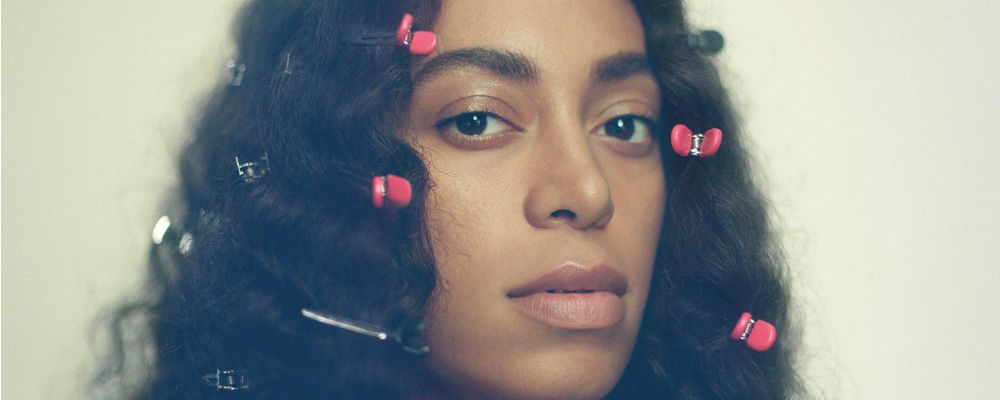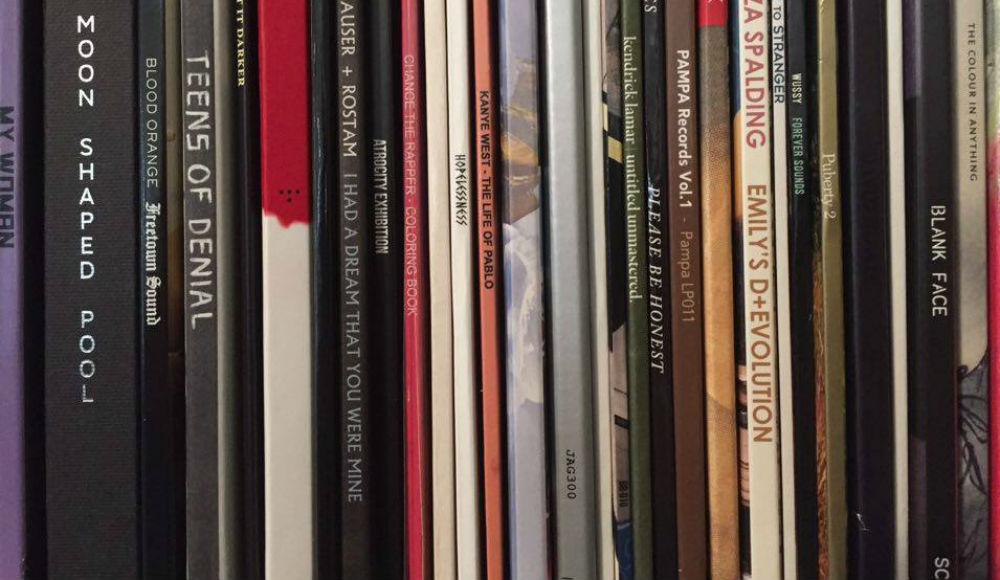The Collapsar and Friends' Favorite Albums of 2016: #'s 5-1
Here we are: the top five. I can't remember the last time a year's top five albums felt so loved, so important, so...inevitable. While only time can truly judge how well these albums will hold up, right now, at this moment, I'd be hard pressed to find another year out of the last twenty with this strong a top five (let alone top ten). Thanks for joining us on this trip through thirty of 2016's best album. If your favorite album didn't make the cut, make sure to vote next year if we do this again (which I hope we do). Otherwise, enjoy the rest of the list and, while your probably familiar with these last five albums already, we hope you found something new you like by reading along. ==
05 | Frank Ocean | Blond | Boys Don't Cry

When Frank Ocean’s pure, untreated voice finally shows up at the end of album opener “Nikes”, even a line like “I mean my balls sticking in my jeans” somehow feels profoundly intimate. And that’s Ocean’s mission on Blond—intimacy. Whereas 2011’s Channel Orange focused on empathy, on storytelling, on understanding others, with Blond, Ocean seems primarily concerned with exposure, nakedness, and, yes, intimacy. From the albums cover photo, which finds Ocean (maybe) crying in the shower, to reports that many of the album’s vocals were recorded relaxed, with a handheld mic, to the perfectly organic production and loose arrangements that emphasize formless, probing guitar lines and gently buoyant rhythm sections rather than the meticulously designed songs that made up Channel Orange, Blond is almost aggressive in its intimacy. But for as much as Blond is an album about intimacy, it also seems to be an album anxiety as, at almost every turn, intimacy is buttressed and bolstered by drugs. In other words, Blond isn’t just an album about sharing, it’s an album about sharing when sharing feels hard, frightening—which means, too, that it’s an album about bravery. It’s also my personal favorite album of the year and, as far as I’m concerned, a flat out masterpiece. So there’s that. –James Brubaker
04 | Chance the Rapper | Coloring Book | Self-Released

Like the best art, listening to this album takes me to unexpected places. Calling Coloring Book rap is perhaps an oversimplification, as each track flows more like deconstructed gospel, at times more obvious than others. The polyphonies here include the numerous artists featured throughout the album. Kanye. Future. 2 Chainz. Even Justin Bieber makes an off-hand appearance. Despite this, the music remains undoubtedly Chance’s, beginning to end, from his trademark noises and for-the-most-part shy demeanor and stripped-down rhythms. And while his musings aren’t as politically overt as Kendrick Lamar’s 2016 highlight To Pimp A Butterfly, they are no less powerful. The opening moments of “All We Got” become a preamble for all that follows, and it’s hard not to read Chance’s life stakes into each song. In a way, listening is a stressful experience, but only in the way reaching a novel’s climax is stressful. The resulting catharsis gives the album deceptive depth, more than its title implies. —Andy Arnold
03 | Solange | A Seat at the Table | Saint Records/Columbia

Just because this is the year of Beyonce’s Lemonade doesn’t mean we should forget about her younger sister’s nearly as compelling album A Seat at the Table. This minimal, but in no way glitchy, R&B record, in the tradition of FKA twigs’ LP1 (2014), is politically introspective in the way Marvin Gaye’s What’s Going On (1971) is. Anchored by minimal beats and washed out keyboard figures, A Seat at the Table is moody and contemplative. One of the many unusual highlights of Solange’s album are the interludes, which feature an extended conversation with Master P about the challenges he faced on his path to success as a rapper and record label mogul in the late 1990s. They intriguingly provide a line of musical and cultural continuity between the No Limit Records mastermind and the Trump-ist world into which A Seat at the Table was delivered this year. Unlike Beyonce’s club-bangers, Solange’s songs are better as headphone music. Lovely, melancholy, oblique love songs like “Cranes in the Sky,” the haunting “Don’t Touch My Hair,” and the Stevie Wonder-esque “Junie” are perfect for the poorly lit dance club between your ears. A Seat at the Table is a great leap forward for Solange and will no doubt be talked about for decades to come. —Brian Flota
02 | David Bowie | Blackstar | Columbia/RCA

Even before Bowie’s unexpected passing just three days after the release of Blackstar, the album was poised to be one of his best in decades. The nearly ten-minute title track invokes eerie, ritualistic imagery with its lyrics, wailing saxophone, call and response, and swelling “ooh” and “ahh” wordless vocalizations. “Girl Loves Me” is reminiscent of some of the trippier sounds of Scary Monsters; the vocals of “Lazarus” are vulnerable, mixing with saxophone that feels like it’s mourning Bowie along with us. While aspects of the whole album feel like a goodbye, “I Can’t Give Everything Away” is where it hits hardest, with Bowie acknowledging his time is short, yet still playing with language and dual meanings. It opens with the lyric “I know something’s very wrong,” and circles through the titular lyric over and over on top of swirling, at times wailing, saxophone. He seems to throw us a small hint as to the “meaning” of his body of work with “ Seeing more and feeling less / Saying no but meaning yes / That is all I ever meant / That’s the message that I sent,” but still leaves us guessing since he “can’t give everything away.”
The hardest thing about listening to Bowie’s still-evolving artistry on this album is knowing there won’t be any more, at least on this plane of existence. But even on that front, Bowie tries to leave us with some comfort: “Something happened on the day he died / Spirit rose a meter and stepped aside / Somebody else took his place and bravely cried / ‘I’m a Blackstar, I’m a Blackstar.’” Let’s hope we’re so lucky. –Carrie Walker
01 | Beyoncé | Lemonade | Parkwood/Columbia

Without question, when we look back on 2016 a few, five-ten-twenty years from now, Lemonade will be the album we remember. It might not be the year’s best album—hell, I’m not even sure I like it as much as Beyoncé’s 2013 self-titled album—but it’s easily the year’s most important album in pretty much every conceivable way. From its already iconic rollout as an HBO exclusive visual album, to its drama-ridden, real life, Rachel Ray inflicting b-story, to the songs’ out-and-out ubiquity, it’s hard to argue against the album’s general air of importance. Of course, it doesn’t hurt that the album is great and easy to love. After opening with the ruminative “Pray You Catch Me”—a prelude of sorts—the album launches into its first showstopper, the bouncy, gleefully pissed off “Hold Up.” But still, for all of that song’s righteous rage, it doesn’t hold a candle to “Sorry,” which is, for my money, already easily one of the best songs of the decade. From the first verse’s demand that her interlocutor “Suck on my balls,” to the chorus’s ecstatic embrace of the big-gesture-kiss-off, all “middle fingers up,” to the breathless vulnerability in the song’s closing moment call out of “Becky with the good hair,” Lemonade is clearly Beyoncé’s most urgent artistic statement. Even outside of those big, tent pole tracks, Lemonade is exceptionally curated and beautifully executed. There’s the funky rock of “Don’t Hurt Yourself” (with a nice assist from Jack White), the vaguely county-ish “Daddy Lessons,” the short-but-elegant “Forward,” which brings James Blake into the fold, and the Kendrick Lamar infused and utterly raucous “Freedom.”
And then there’s early single “Formation.” Left off of HBO’s airing of the visual album, but seemingly a part of the audio album proper, I can’t help but think that “Formation” is the appropriate point of entry into any discussion of Lemonade. Why peg so much on a single song? Because “Formation”—a song that functions as both declaration of personal empowerment and a protest song of sorts—gets to the slick, slippery guts of what makes Lemonade such a vital, necessary album. And while I might not be particularly qualified to talk about the stakes attached to an album like Lemonade, I have seen enough to feel this album’s vital importance to every interaction in such a politically super-charged year. I feel this album every time a person of color is unjustly killed. I feel this album’s importance every time a friend from high school or distant family member posts on Facebook comparing Beyoncé to the Ku Klux Klan because of her Super Bowl Half Time Show. I feel its importance every time a Fox News pundit calls for and encourages police officers to boycott working Beyoncé’s concerts in protest of her politics. I feel its importance every time some bullshit person brushes off a phrase like “Grab ‘em by the pussy” as locker room talk. Yeah—this album is fucking important.
And maybe it will make a difference. Recently, I was told by a young woman, a longtime Beyoncé fan, that Queen Bey has lost her touch, that the songs just don’t make sense anymore. When I asked the young woman what she meant, she said that Lemonade was weird and didn’t make sense, though she couldn’t articulate her feelings any more than that. But maybe that’s a good thing. Maybe that means that Lemonade is doing the work it was intended to do, is resonating, is making people uncomfortable, is getting under skin and teaching us some shit about shit we don’t know shit about. So yeah, Lemonade isn’t my favorite album of 2016, but I’m still thrilled that it landed on the top of this list because it is, without a doubt, one of the most important albums to come around in a long time. –James Brubaker



